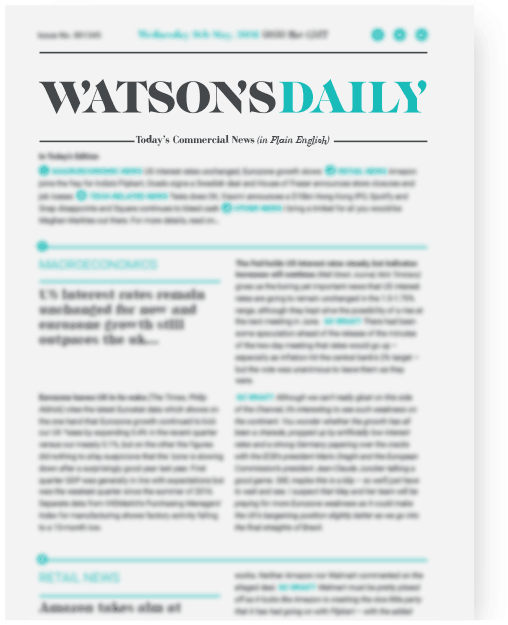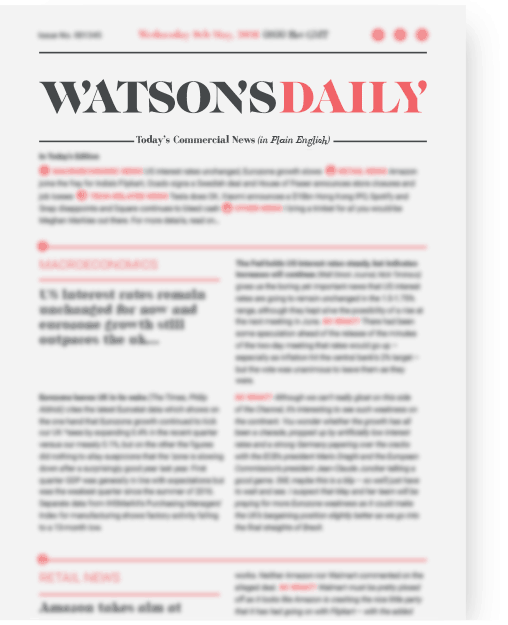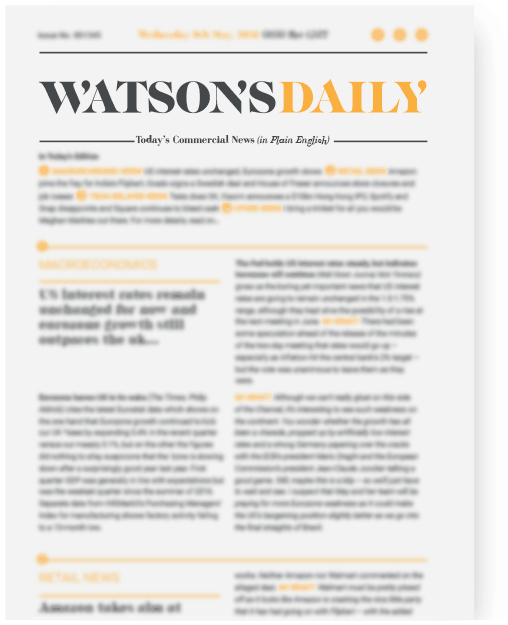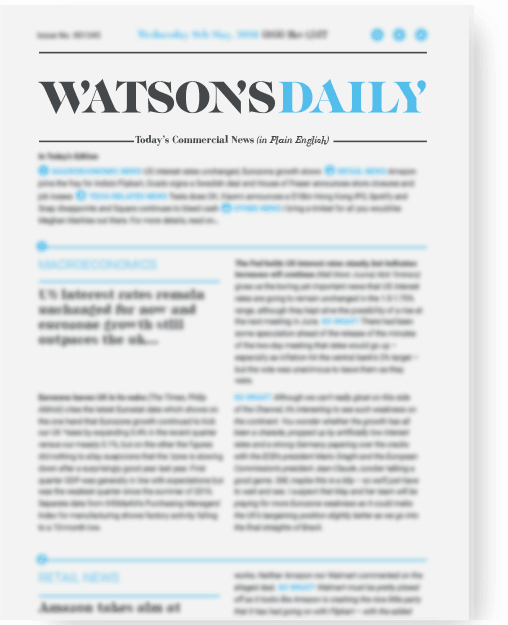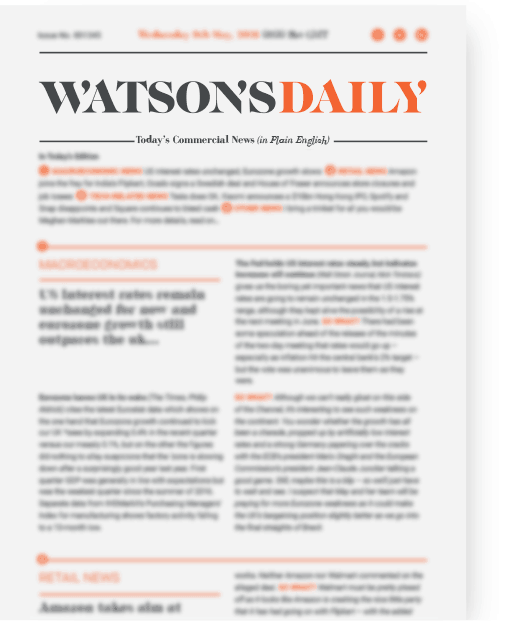- In MACROECONOMIC NEWS, we see reactions to Sunak’s announcement and Indian companies look to Chinese alternatives
- In RETAIL & CONSUMER NEWS, Boohoo’s woes persist, Brooks Brothers files for Chapter 11 and Klarna warns of overspend
- In NEWS ON “WINNERS” & LOSERS, Deutsche Post rewards its workers, United Airlines and AirAsia face tough times and FirstGroup might cease trading
- In TECH NEWS, Big Tech thinks about leaving Hong Kong and Twitter mulls a subscription option
- AND FINALLY, I bring you some current music trends (who’d have thought!)…
1
MACROECONOMIC NEWS
So Sunak targets youth and spending and India looks to wean itself off China…
Sunak’s plan welcomed but fears remain (The Times, Alex Ralph and Simon Duke) looks at the emergency package announced yesterday by the UK chancellor Rishi Sunak. His overarching aim was to “protect, support and create jobs” and announced a temporary VAT cut for the hospitality sector from 20% to 5% until January, an “eat out to help out” discount scheme to encourage people to go to restaurants. On the jobs front, he unveiled a £2bn fund to create jobs for young people, a £1bn boost to fund job centres and an incentive scheme to reward employers for keeping on staff into January. He also raised the stamp duty threshold on homes up to £500,000 until March next year as well as a £2bn fund to decarbonise buildings. Champagne stays on ice in markets (The Times, Tom Howard) showed an underwhelming reaction from markets as shares in pubs, restaurant and hotel groups rose initially on news of the VAT cut but then finished trading in negative territory as scepticism crept in over whether the measures will really work. Investors had been buying into housebuilder stocks in the hope of a cut in stamp duty – so when it was announced, they sold off to take profits. This is a perfect example of the market saying “buy the mystery, sell the history”. Hospitality firms toast VAT cut and discounts for diners (Daily Telegraph, Oliver Gill) shows that the industry celebrated Sunak’s announcement (if you want more detail, you should read this – there are some
good charts in here) but then, on the other hand, Retailers complain over VAT cut exclusion (Daily Telegraph, Michael O’Dwyer and Laura Onita) reflects the disappointment of those who weren’t sprinkled with Sunak’s fairy dust. I guess that you can’t please everyone, but you can’t blame those who were left out for continuing to push for support. It remains to be seen whether these moves will be enough to keep the economy going.
Following on from India’s recent banning of Chinese apps, Border clash prompts Indian industry to seek China alternatives (Financial Times, Benjamin Parkin) shows that Indian companies are looking for alternatives to the Chinese suppliers on which they’ve become increasingly reliant over the years, given the risk that increasing geopolitical tensions could result in more sanctions. China’s share of total imports into India was less than 3% in 2000, but is now 14%. The country’s pharmaceutical sector gets about 70% of its starting ingredients from China and Chinese mobile phones from makers such as Xiaomi are ubiquitous. India’s automakers also source about 25% of their components from China. * SO WHAT? * Clearly tensions are running high at the moment following the recent death of the Indian soldiers in a clash with Chinese soldiers on the Himalayan border. However, given China’s importance to Indian industry I would have thought switching supply chains will take quite some time – and I suspect that many companies and industries in other countries around the world will be trying to do the same thing at the same time! I’d say that one of the many things that the coronavirus outbreak has taught us is how reliant so many key supply chains are on China. Weaning off China suppliers will be a tall order, I suspect.
2
RETAIL & CONSUMER NEWS
Boohoo’s woes continue, Brooks Brothers files for Chapter 11 and Klarna warns consumers…
Review of sweatshops no relief as Boohoo shares tumble again (The Times, Ashley Armstrong and Gurpreet Narwan) shows that shares in online retailer Boohoo fell yet again yesterday following allegations of modern slavery at a factory in Leicester. Since the allegations surfaced, the company has hired Alison Levitt, QC from Mischon de Reya to investigate its suppliers’ adherence to minimum wage rules and Multiple Boohoo inspections find no modern slavery offences (Financial Times, Patricia Nilsson, Alex Barker, Laura Hughes and Jonathan Eley) shows that nothing dodgy has been uncovered so far despite inspections of Leicester factories by the GLAA, Leicestershire Police, Leicester City Council, the National Crime Agency, Health and Safety Executive, Leicestershire Fire and Rescue and Immigration enforcement. * SO WHAT? * This is very bad PR for Boohoo, but then again it seems that the clothing that caused the furore in the first place was not actually made there – it was just being repackaged there. Other inspections have failed to turn anything up as yet but then again it may take some time given that Leicester’s textile industry is incredibly fragmented – 1,000 manufacturers employ less than 10 staff, for instance. This has definitely taken a lot of the recent sheen off Boohoo’s recent purple patch, but unless investigators can find anything nothing has really changed. In the meantime, Boohoo’s share price has fallen by a third – but it will be under a cloud until there is some kind of conclusion forthcoming from the investigation.
Brooks Brothers, hurt by casual Fridays and coronavirus, files for bankruptcy (Wall Street Journal, Suzanne Kapner and Soma Biswas) shows the latest US retailer to bite the dust as it filed for bankruptcy protection yesterday. It follows the likes of Neiman Marcus, J.Crew and J.C.Penney as it seems that coronavirus lockdown proved to be the final straw in a business that was already suffering from changing consumer tastes (more casual, less smart) and behaviour (buying more online). It is now seeking a buyer. What a shame for a company that has been around for over 200 years and managed to survive two world wars. Fun fact: did you know that Marks & Spencer owned Brooks Brothers between 1988 until 2001? I did. That’s why I’m such an incredibly exciting bloke 👍.
Then in ‘Buy now, pay later’ firm warns of impulse buying (The Times, Patrick Hosking) we see that the market leader in “buy now, pay later” financing, Klarna, is going to launch a campaign to warn shoppers against buying stuff they don’t want (but I bet they mean “don’t buy stuff you can’t afford” but can’t quite bring themselves to say it 😜)! Klarna is Europe’s join-largest fintech company (the other one is Revolut) and it said it will be rolling out this campaign across TV and social media. They want would-be consumers to ask “Do I love it? Will I use it? Is it worth it?” (they missed out Queen of Tidying, Marie Kondo’s question “Will it bring me joy?” 😂). * SO WHAT? * Surely this is like Diageo launching a campaign to get everyone to be teetotal or for British American Tobacco to push the benefits of not smoking!!! Thus far, Klarna has emphasised the benefits of offering a “pay later” service because they say that it boosts sales by up to 20%, but this campaign heralds a real back-track. Call me paranoid, but it looks to me like the company is hugely concerned that many customers will “default” and that they are desperately trying to pre-empt a potentially huge problem.
3
NEWS ON "WINNERS" & LOSERS
Deutsche Post DHL employees get bonuses, United and AirAsia face problems – as does FirstGroup (when was the last time you were on a train or bus??)…
There’s good news for employees in Deutsche Post DHL will award bonus to 500,000 workers (Financial Times, Joe Miller) as the company, one of the world’s largest in logistics, said it will give over 500,000 of its employees a €300 bonus and pay a dividend. It can do this because it has been a major beneficiary of the boom in online shopping and increased demand for freight capacity during lockdown. Deutsche Post: stamp of approval (Financial Times, Lex) applauded the company’s performance and compares it to the struggling Royal Mail. Deutsche Post’s profitability is helped by a supportive domestic mail regulator and the lucrative business from its B2B DHL parcels delivery service.
The nightmare for airlines continues in AirAsia shares fall 18% as auditor raises ‘going concern’ doubts (Financial Times, Stefania Palma) which highlights an uncertain future for the Malaysian airline and United Airlines warns it may furlough 36,000 staff (Wall Street Journal, Doug Cameron and Alison Sider) shows that, despite getting government handouts, it’s still going to hunker down for a tricky time. * SO WHAT? * The whole industry is just in a tailspin and survival is far from certain for many airlines. We just won’t know who the survivors will be and it will absolutely depend on how quickly any travel restrictions can be lifted.
It’s not much better in FirstGroup could cease trading as coronavirus hits passenger levels (The Guardian, Gwyn Topham) as the UK’s biggest bus company and railway operator says that it may have to stop trading because of the massive drop in passenger numbers. * SO WHAT? * The company is getting absolutely mullered by coronavirus and passengers not commuting – and the timing of it trying to sell off its US bus operations couldn’t be worse! It has some cash buffer but I guess the company is really saying this to prompt more reassurance from the government.
4
INDIVIDUAL COMPANY NEWS
Big Tech gets nervous about Hong Kong and Twitter looks at subscription…
Silicon Valley weighs whether to leave Hong Kong (Financial Times) shows that the latest legal reforms from China are causing concern for Silicon Valley’s finest. At the moment, Facebook, Twitter, Google, Zoom and LinkedIn (owned by Microsoft) said they will “pause” any data requests from law enforcement while Apple and Amazon are “assessing” and “reviewing” their positions respectively. * SO WHAT? * The implications of the new security law are far-reaching and will be very concerning for users. It’s early
days yet and Hong Kong is not a major part of the companies’ overall business – but they will be having a long hard think about their next move and how they will respond to authorities.
Twitter signals interest in developing subscription service (Wall Street Journal, Robert McMillan) highlights what could be a real departure for Twitter as the company said it was developing a subscription service (presumably to diversify its revenue streams away from a reliance on advertising, which is a bit dodgy at the moment). * SO WHAT? * Twitter has been under pressure to seek out more revenue sources and the recent social media ad boycott is shining a harsh spotlight onto a sensitive subject for the company. Will it work? I’m not so sure. I don’t think Twitter is “sticky” enough for users to feel compelled to stay with it under a subscription model, but I guess we’d have to see what the offering is before deciding.
5
...AND FINALLY...
…in other news…
I thought I’d leave you today with the latest in music trends – check me out!!!
Some of today’s market, commodity & currency moves (as at 0753hrs green is up, red is down). THIS IS INTENDED AS A ROUGH GUIDE ONLY!
| FTSE 100 * | Dow Jones * | S&P 500 * | Nasdaq* | DAX * | CAC-40 * | Nikkei ** | Shanghai ** |
| 6,156 (-0.55%) | 26,015 (-0.20%) | 3,170 | 10,493 | 12,495 (-0.97%) | 4,981 (-1.24%) | 22,515 (+0.24%) | 3,451 (+1.39%) |
| Oil (WTI) p/b | Oil (Brent) p/b | Gold Per t/oz | £/$ | €/$ | $/¥ | £/€ | $/₿ |
| $40.7900 | $43.1900 | $1,811.95 | 1.26306 | 1.13591 | 107.29 | 1.11194 | 9,409.54 |
(markets with an * are at yesterday’s close, ** are at today’s close)





